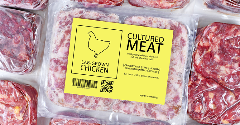News
Chobani coconut yogurt is now Fair Trade certified
16 Dec 2020Greek yogurt maker Chobani announced that its coconut yogurt blends are now made with Fair Trade Certified coconuts, saying that it is the first national brand to earn this certification for a coconut blend in the yogurt aisle. The Fair Trade Certified designation signifies that a product was made using production standards that promote sustainable livelihoods and safe working conditions, protection of the environment, and strong, transparent supply chains.
It has only been two years since Chobani’s coconut-based non-dairy yogurts appeared on supermarket shelves, but in that time the company obtained the rigorous Fair Trade Certification for its coconuts to offer customers not only an alternative dairy option in the yogurt aisle but also a sustainable choice – a consideration that is increasingly in demand for consumers.

Chobani has continually been a disruptor in the yogurt space. It became a market leader after reinvigorating the Greek yogurt category several years ago, and since then, it has continued to revolutionize the entire grocery segment. With sales of traditional Greek yogurt falling about $400 million since 2015 to about $3 billion in 2019, according to Nielsen data, Chobani has looked toward non-dairy options as well as kids yogurt and yogurt blends to maintain interest in the brand. And it has been successful. While yogurt sales have slumped for competitors like General Mills and Danone, Chobani has continued to report a healthy balance sheet.
This latest initiative is in response to questions about the sustainability of coconut products. When coconut became a popular dairy alternative several years ago, demand soared raising questions among manufacturers about potential shortages and driving prices up by as much as a third. Rapidly increasing demand for coconuts also caused concern regarding their unregulated production that had the potential to contribute to deforestation, exploitation and environmental impacts in certain areas. Despite the headwinds streaming against coconut production, the tropical fruit has remained an in-demand ingredient and prompted consumers to ask for sourcing transparency from manufacturers purchasing this product.
According to Fair Trade USA, 95% of coconuts are harvested by smallholders, who lack access to global markets on fair terms. In the Philippines, a major coconut-producing region, this means most coconuts are harvested by farmers who live on less than $1 a day. By Chobani earning a Fair Trade Certified seal, it offers consumers assurances that those farmers who are providing the company its coconuts are paid in a manner that is commensurate with responsible business and fair pay.
In the U.S. and Europe, earning such a seal will likely be beneficial to a company such as Chobani. A report released this summer from IRI and the NYU Stern Center for Sustainable Business found that products that are marketed as sustainable are driving sales growth. In the report, that between 2015 and 2019, sustainability-marketed products represented 16.1% of the total CPG market but were responsible for 54.7% of the overall growth.
Related news

‘Health’ labels on products reduce consumers’ willingness to pay
10 Mar 2025
A study into front-of-packaging “health” labelling finds that these labels alone can lower US consumers’ willingness to pay.
Read more
Food industry lags on healthier product formulation, nutrition index finds
7 Mar 2025
The world’s biggest food manufacturers derive just 34% of their sales from healthier products, according to the 2024 Global Access to Nutrition Index.
Read more
Does calorie labelling lead to reduced consumption?
27 Feb 2025
Calorie labelling of food products leads to a small, but consistent, reduction in the number of calories consumed, a study suggests.
Read more
F&B industry hit with fresh greenwashing claims
26 Feb 2025
The food and beverage (F&B) industry is under fresh scrutiny amid claims of greenwashing, with Arla the latest company in the firing line.
Read more
Have scientists discovered a new tool to measure UPFs?
19 Feb 2025
Researchers have developed a new scoring system and database, compiling over 50,000 food items, of which over 1,000 are classified as ultra-processed.
Read more
Singapore explores farmland-free food production
17 Feb 2025
Researchers discover new technology replicating on-farm food production conditions from within the indoor lab environment.
Read more
Most consumers lack trust in AI, but supplement users are ready to embrace the technology
14 Feb 2025
A survey of UK and US consumers found that most supplement users are willing to let AI make decisions on their behalf, but they also demand greater transparency.
Read more
Indians enjoy first bites of cultivated chicken
13 Feb 2025
The first public tasting of cultivated meat in India has taken place as the country prepares for the first commercial cultivated meat products – potentially as early as the end of this year.
Read more
Disruptor brands spearhead sustainable solutions
11 Feb 2025
Manufacturers, big and small, sharpen their focus by providing sustainable products and services centred on comprehensive and sustainable approaches to traditional methods.
Read more
The future of UPF regulation: Stricter labelling, more taxation, and no more conflicts of interest?
10 Feb 2025
Policymakers are intensifying efforts to regulate ultra-processed foods (UPFs), as mounting evidence links their consumption to increased risks of obesity, cardiovascular disease, and other chronic health issues.
Read more